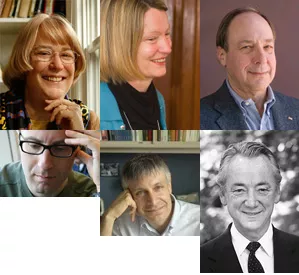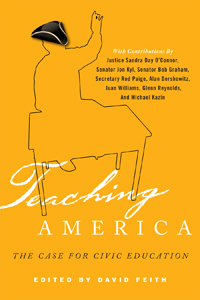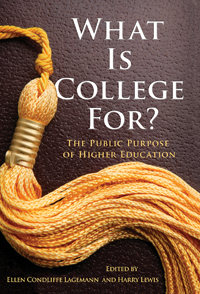
The Fate of Civic Education in a Connected World
A "Fred Friendly" Seminar
Featuring Professor Charles Nesson as Provocateur and Ellen Condliffe Lagemann (Bard College), Peter Levine (Tufts University), Harry Lewis (Harvard SEAS), Elizabeth Lynn (Project on Civic Reflection) and Juan Carlos de Martin (Berkman Center) as participants.
Civic education is the cultivation of knowledge and traits that sustain democratic self-governance. The broad agreement that civic education is important disintegrates under close scrutiny. As the social networks of individuals become less based on geography and more based on friendships and common interests, consensus on shared civic values seems harder to achieve. American education is under stress at every level, and schools and colleges must re-imagine their commitment to civic education. This seminar will probe tensions that make civic education difficult, for example:
- What's the problem? Doesn't everyone agree that civic education is important? Is civic education being squeezed out in schools, either because of the demands of subject testing or the desire to avoid political controversy?
- Does the connectedness of social media support or impair the sorts of connections that lead to active citizenship?
- Every tertiary institution wants to be a "global university." What, if any, are the civic responsibilities of a global institution? What civic values are transnational? Should American students learn the Universal Declaration of Human Rights?
- What about civic education outside of school--for adults, prisoners, and the home-schooled, for example?
- Then there was model UN; now there are online simulations. Do they achieve the same ends?
- Does civic education include instruction in civic activism, using social media for example?
- With connectedness come instantaneity and constant interruptions. Is it even possible to maintain anyone's attention on understanding anything as subtle as the complexities of representative government?
This lively, "Fred Friendly" style seminar is timed to coincide with publication of two edited volumes: Teaching America: The Case for Civic Education (David Feith, ed.; Rowman & Littlefield), and What is College For?: The Public Purpose of Higher Education (Ellen Condliffe Lagemann and Harry Lewis, eds.)
 |  |
Participants include:
| Ellen Condliffe Lagemann is the Levy Research Professor at Bard College, a Senior Scholar at the Levy Economics Institute, and a Distinguished Fellow at the Bard Prison Initiative. Previously, she served as dean of the Harvard Graduate School of Education, as president of the Spencer Foundation, and as a faculty member at NYU, Columbia University, and Teachers College. Her most recent book is What is College For?: The Public Purpose of Higher Education, which she edited with Harry Lewis. |
| Peter Levine (www.peterlevine.ws) is Director of CIRCLE, The Center for Information and Research on Civic Learning and Engagement, and research director of Tufts University’s Jonathan Tisch College of Citizenship and Public Service. A philosopher by training, he is the author of The Future of Democracy: Developing the Next Generation of American Citizens (2007), five other scholarly books, and a novel. He co-organized the writing of The Civic Mission of Schools, a report that led to a national advocacy campaign. He has served on the boards or steering committees of AmericaSpeaks, Street Law, the Newspaper Association of America Foundation, the Campaign for the Civic Mission of Schools, the Kettering Foundation, the American Bar Association Committee’s for Public Education, the Paul J. Aicher Foundation, The Democracy Imperative, and the Deliberative Democracy Consortium |
| Harry Lewis joined the Harvard faculty in the fall of 1974, and became Gordon McKay Professor of Computer Science in 1981. In 2003 he was honored with the title of Harvard College Professor in honor of his teaching excellence. From 1995-2003 Lewis served as Dean of Harvard College. In this capacity he oversaw the undergraduate experience, including residential life, career services, public service, academic and personal advising, athletic policy, and intercultural and race relations. He is a long time member of the College’s Admissions Committee. Lewis is the author of five books and numerous articles on various aspects of computer science. |
| Elizabeth Lynn founded the Project on Civic Reflection in 1998, with support from Lilly Endowment, and guided its evolution into a national resource center for reflective discussion about service, philanthropy and civic engagement. She is now a Senior Research Fellow in Humanities and Civic Life at Valparaiso University. Elizabeth received a PhD in Religion and Literature from the University of Chicago and is the coeditor with Adam Davis of The Civically Engaged Reader. An active citizen in her community and state, Elizabeth serves on the advisory board of the Lake Institute on Faith and Giving in the Center on Philanthropy at Indiana University, the board of Indiana Humanities, and the Valparaiso Board of Zoning Appeals. |
| Juan Carlos De Martin is a Berkman Faculty Fellow and Faculty co-director of the NEXA Center for Internet & Society at the Politecnico of Torino, Italy, which he co-founded in 2006. A computer engineering professor with research interests focusing on digital media processing and transmission, he has been broadening the scope of his attention to the more general theme of the interaction between digital technologies and society. His most recent main interest is the future of university in the Internet age, a topic on which he is writing a book. In 2003 he started to lead, together with prof. Marco Ricolfi, the Creative Commons Italy team (link: http://creativecommons.it); since 2005 he has been representing, on a volunteer basis, Creative Commons in Italy. Between 2007 and 2011 Juan Carlos De Martin was the coordinator of COMMUNIA, the European thematic network on the digital public domain. Since 2007 he is president of the libraries of the Politecnico di Torino. |
| Charles Nesson (Provocateur) is William F. Weld Professor of Law at Harvard Law School and Founder and Faculty Co-Director of the Berkman Center for Internet & Society. |


